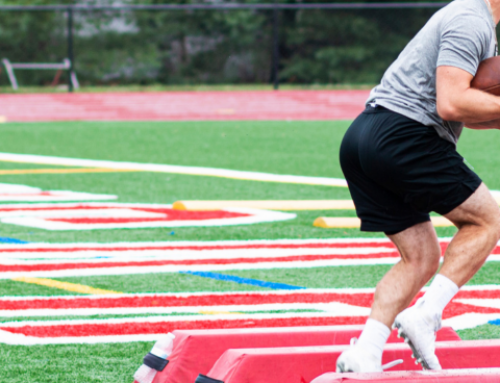If you’re the parent of an athlete, you probably know how tempting it can be to morph into one of those crazy parents on the sidelines. So before the season goes any further, let’s lay down some sports parenting ground rules, which will not only help you keep a balanced perspective, but also help your child have a fun and rewarding experience.
- DO see the bigger picture of youth sports. Watching your child play sports is a blast. Seeing him or her earn awards, or her get his or her name in the paper, makes you proud. But what will be left after your child quits playing sports? Trophies and press clippings are fun; however, nothing is more important than who your child becomes in the process.
- DO NOT coach your child during a game. Sit in the stands, enjoy the game, and let the coach do his job. Your interference will only confuse and distract your child, who does not need to be looking at you and listening to your shouted instructions. He or she needs to be listening to the coach, having fun and focusing on doing his or her job.
- DO learn to bite your tongue. It’s not necessary to tell your child what you’re thinking: You should have tried harder to get that goal; be careful, your coach might replace you in that spot. You don’t have to ask that question you’re dying to ask: why didn’t your coach play you more? Negative statements and questions do not help your child play better.
- DO NOT fight your child’s battles. Is your daughter struggling with playing time issues in softball? Let her talk to her coach about what she needs to do to improve. Is your son frustrated because he wants to play offense instead of defense in football? Let him have that conversation with his coach. You do not do your child any favors by stepping in to fight his or her battles. Instead, you are robbing them of an opportunity to grow as they learn to figure things out on their own.
- DO support the coach. You don’t have to like the coach or agree with his or her game strategy, but your support helps the coach do a better job. Parents who tear the coach down, whether to his face or behind his back, distract him from doing his best. That said, if the coach is doing something morally or ethically wrong, parents do need to speak up.
- DO NOT push, push, push. One gentle nudge or push is OK if your child is hesitant to try a sport. But constantly pushing your child to work extra and work harder can result in a damaged parent/child relationship and a child playing a sport that he or she really doesn’t want to play.
- DO volunteer to help. Youth sports depend on volunteers to stay alive. You don’t have to be the team parent or work the snack bar at every game, but find something you can do to help. If every parent steps up and does something—no matter how small the task—everything will get done and one person won’t be shouldering the burden alone.
- DO NOT go broke so your child can play sports. If you find the cost of youth sports is draining your wallet, look for less expensive alternatives. Your family’s needs should not suffer just because you’ve decided your child will become a pro soccer player and needs to play on an elite team and get expensive training. More money invested will not make your child a better athlete.
- DO cheer for the whole team, not just your child. It’s easy for parents to get so focused on how their kids are doing in the game that they forget to support the other players. But when you cheer for the whole team, you are reinforcing sportsmanship to your child and letting him or her know that it takes a team to play well.
- DO NOT join sympathy groups. At every game, there are parents who gather to complain and whine—about the coach, the team, the refs or other parents. These “sympathy groups” foster negativity and do not offer productive solutions to issues that inevitably crop up during a season.
These do’s and don’ts can’t promise you and your child a winning season, but they will give you a more positive and enjoyable youth sports experience.
Read More
9 Easy Steps to Destroy Your Child’s Athletic Career
RECOMMENDED FOR YOU
MOST POPULAR
If you’re the parent of an athlete, you probably know how tempting it can be to morph into one of those crazy parents on the sidelines. So before the season goes any further, let’s lay down some sports parenting ground rules, which will not only help you keep a balanced perspective, but also help your child have a fun and rewarding experience.
- DO see the bigger picture of youth sports. Watching your child play sports is a blast. Seeing him or her earn awards, or her get his or her name in the paper, makes you proud. But what will be left after your child quits playing sports? Trophies and press clippings are fun; however, nothing is more important than who your child becomes in the process.
- DO NOT coach your child during a game. Sit in the stands, enjoy the game, and let the coach do his job. Your interference will only confuse and distract your child, who does not need to be looking at you and listening to your shouted instructions. He or she needs to be listening to the coach, having fun and focusing on doing his or her job.
- DO learn to bite your tongue. It’s not necessary to tell your child what you’re thinking: You should have tried harder to get that goal; be careful, your coach might replace you in that spot. You don’t have to ask that question you’re dying to ask: why didn’t your coach play you more? Negative statements and questions do not help your child play better.
- DO NOT fight your child’s battles. Is your daughter struggling with playing time issues in softball? Let her talk to her coach about what she needs to do to improve. Is your son frustrated because he wants to play offense instead of defense in football? Let him have that conversation with his coach. You do not do your child any favors by stepping in to fight his or her battles. Instead, you are robbing them of an opportunity to grow as they learn to figure things out on their own.
- DO support the coach. You don’t have to like the coach or agree with his or her game strategy, but your support helps the coach do a better job. Parents who tear the coach down, whether to his face or behind his back, distract him from doing his best. That said, if the coach is doing something morally or ethically wrong, parents do need to speak up.
- DO NOT push, push, push. One gentle nudge or push is OK if your child is hesitant to try a sport. But constantly pushing your child to work extra and work harder can result in a damaged parent/child relationship and a child playing a sport that he or she really doesn’t want to play.
- DO volunteer to help. Youth sports depend on volunteers to stay alive. You don’t have to be the team parent or work the snack bar at every game, but find something you can do to help. If every parent steps up and does something—no matter how small the task—everything will get done and one person won’t be shouldering the burden alone.
- DO NOT go broke so your child can play sports. If you find the cost of youth sports is draining your wallet, look for less expensive alternatives. Your family’s needs should not suffer just because you’ve decided your child will become a pro soccer player and needs to play on an elite team and get expensive training. More money invested will not make your child a better athlete.
- DO cheer for the whole team, not just your child. It’s easy for parents to get so focused on how their kids are doing in the game that they forget to support the other players. But when you cheer for the whole team, you are reinforcing sportsmanship to your child and letting him or her know that it takes a team to play well.
- DO NOT join sympathy groups. At every game, there are parents who gather to complain and whine—about the coach, the team, the refs or other parents. These “sympathy groups” foster negativity and do not offer productive solutions to issues that inevitably crop up during a season.
These do’s and don’ts can’t promise you and your child a winning season, but they will give you a more positive and enjoyable youth sports experience.
Read More
9 Easy Steps to Destroy Your Child’s Athletic Career
5 Things Sports Parents Must Discuss With Their Athletes
10 Signs You’re a Horrible Sports Parent











